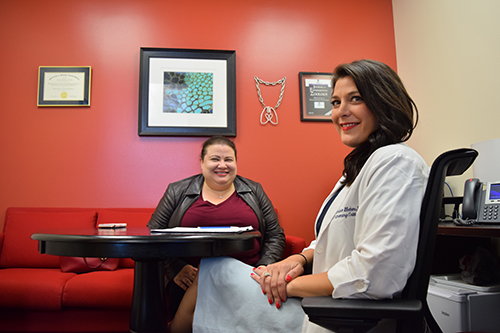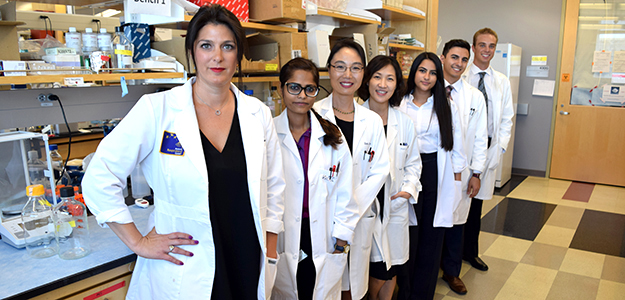 Two University of Arizona investigators, Louise Hecker, PhD, and Heidi Mansour, PhD (at right), were awarded a two-year, $415,491 research grant from the National Institute on Aging (NIA), a unit of the National Institutes of Health (NIH), to develop an aerosolized version of an oral drug approved to treat multiple sclerosis and evaluate its effectiveness for treating idiopathic pulmonary fibrosis (IPF), an advanced lung disease affecting older people.
Two University of Arizona investigators, Louise Hecker, PhD, and Heidi Mansour, PhD (at right), were awarded a two-year, $415,491 research grant from the National Institute on Aging (NIA), a unit of the National Institutes of Health (NIH), to develop an aerosolized version of an oral drug approved to treat multiple sclerosis and evaluate its effectiveness for treating idiopathic pulmonary fibrosis (IPF), an advanced lung disease affecting older people.
The NIH Exploratory/Developmental Research Grant Awards, or R21 grants, are intended to encourage exploratory/developmental research by providing support for the early and conceptual stages of project development with high impact potential and paradigm-shifting therapies.
The NIA/NIH grant will fund Drs. Hecker and Mansour’s work as principal investigators on a project titled “Pre-Clinical Development of a Novel Nrf2-Activator Formulation for the Treatment of Idiopathic Pulmonary Fibrosis.”
The lab of Dr. Heidi Mansour (pictured above on left with Dr. Hecker) is one of only a few U.S. academic research labs that design, develop and optimize dry powder inhalers using nanotechnology, translational engineering and advanced drug delivery principles.
IPF(link is external) is a disease of aging, with a mean age at diagnosis of 66 for victims. It involves progressive fibrosis, or “scarring,” that leads to stiffening and thickening of tissue deep in a person’s lungs over time. This scar tissue formation—the cause of which often is unknown—makes it difficult to transport inhaled oxygen into the bloodstream. IPF is a fatal disease and most patients live just three to five years after diagnosis, the NIH reports. The most common form of death for sufferers is respiratory failure.
Dimethyl fumarate (DMF)(link is external) is approved by the U.S. Food and Drug Administration and is the active ingredient in an oral drug product used for treatment of multiple sclerosis (MS)(link is external) as an oral drug product to reduce the relapse rate and decrease progression of MS. The drug acts on the same genetic pathway (via the protein Nrf2(link is external)) which Dr. Hecker has previously shown(link is external) to be important in disease progression of fibrosis in IPF patients.
The goal of this project is to evaluate safety and efficacy of newly designed DMF antioxidant formulations in both oral versus inhaled routes of administration as a novel IPF therapy. The investigators hope the inhaled version, targeted directly to the lung regions affected by IPF patients, will prove more safe and effective as a new drug indication for a critical lung disease with unmet medical needs. This novel approach may provide a first-in-class therapeutic platform for treatment of IPF, Drs. Hecker and Mansour said.
 Dr. Hecker (left) and her research team in her lab at the UA Medical Research Building.
Dr. Hecker (left) and her research team in her lab at the UA Medical Research Building.
Dr. Hecker is an assistant professor of medicine in the UA Division of Pulmonary, Allergy, Critical Care and Sleep Medicine in the Department of Medicine at the UA College of Medicine – Tucson. She’s also a research investigator with the Southern Arizona VA Health Care System. Her work focuses on understanding how normal repair responses “go awry” in aging, and how this contributes to the susceptibility of age-associated lung diseases, as well as the development of novel solutions to treat these age-related disorders.
Dr. Mansour is an assistant professor of pharmaceutical sciences and medicine at the UA College of Pharmacy and UA College of Medicine – Tucson. She teaches in the PharmD program and in the graduate program (Pharmaceutics and Pharmacokinetics track). For lung diseases, she specializes in designing and developing inhalable microparticulate/nanoparticulate dry powders that are tailored and optimized for FDA-approved human inhaler devices. Incorporating nanotechnology, bioengineering and aerosol medicine, these are targeted directly to the lung and are biocompatible, biodegradable, mucopenetrating and provide sustained drug release as measured by required FDA/U.S. Pharmacopeia in vitro and in vivo tests.
Drs. Hecker and Mansour’s grant (Award No. R21AG054766(link is external)) runs through March 2019. Both are members of the UA BIO5 Institute.
ALSO SEE:
“Sickle Cell, Congenital Heart Disease Focus of UA Researcher NIH Awards Worth Nearly $5.21M” | Posted April 3, 2017
“Photos, Video Available on DOM Research Seminars, PMI Town Hall, Sleep Center Open House” | Posted Dec. 9, 2016
“DOM Research Seminar to Spotlight Sleep Medicine, Novel Therapeutics for Fibrotic Diseases, Nov. 10” | Posted Oct. 21, 2016
“FEATURE SPOTLIGHT: Pharmacy Faculty Member Helps People Breathe Better” | Posted Feb. 29, 2016

